- Home
- Dave Eggers
The Captain and the Glory Page 3
The Captain and the Glory Read online
Page 3
“Now what?” he asked his daughter.
Together they looked at the controls. The Captain hoped he might find a button that said FORWARD or STRAIGHT, but there was no such button.
“I think I’ve got it,” his daughter said. The Captain turned to find her reading a book; immediately his stomach tightened. “I think you can just hold the wheel straight,” she said, “and it will go straight.”
The Captain put his hands on the wheel and found that without moving it at all, the ship slowly and majestically left port and sailed into the open sea. It was clear to him, at that moment, that he was the greatest captain that had ever captained.
VIII
AFTER A FEW MINUTES, though, the Captain grew bored.
Standing alone on the bridge was boring. And the sea ahead was boring. It didn’t move! The horizon was just the horizon, and the sun was just the sun, and there weren’t even any clouds or storms to look at. Where were the whales? He saw no whales.
Then he had an idea. He nudged the wheel a bit left, and the entire ship listed leftward, which was both frightening and thrilling. He turned the wheel to the right, and the totality of the ship, and its uncountable passengers and their possessions, all were sent rightward. In the cafeteria, where the passengers were eating lunch, a thousand plates and glasses shattered. An elderly man was thrown from his chair, struck his head on the dessert cart and died later that night.
High above, the Captain was elated by the riveting drama caused by the surprises of his steering. For the first time he felt the power of the enormous ship, and felt that he’d arrived at how to make an otherwise sterile experience—that of standing more or less alone on the sealed and secure bridge of a ship—feel viscerally alive. He was so filled with energy and inspiration that he decided to deface the photographs of all the Glory’s previous captains.
The back wall of the bridge featured a gallery of dignified photos of all the Captain’s predecessors, and ever since he’d taken the wheel, the Captain had found these portraits aggravating, given that there were so many of them, and none were of himself. So he took his wipe-away marker and drew horns and warts and missing teeth onto the other captains, starting with the captains who had built the ship, all of whom were dead and few of whom had voted for him. In fact, he realized, because they were all dead, none of the previous captains had voted for him, which provoked a billowing rage within the Captain which he channeled into more creative defacements of their portraits. He worked his way from the very first captains to the most recent, and when he got to a particular portrait, he stopped.
This face, that of the captain known as the Admiral, caused him great consternation. The Admiral was considered by all to be a hero of war and a paragon of dedication to the Glory, and so many other insufferable bullshit things that got under the Captain’s skin and always had.
It started during the terrible battle that the Captain had avoided by hiding in the bowels of the ship reading pornography. During that war, the Admiral—then a young man, just a midshipman—had fought bravely, and had been captured and tortured by a terrible pirate known as the Pale One. When the war with the Pale One ended, and the Admiral was returned, the passengers of the Glory all praised him, saying he was honorable and courageous, and every time they said these things, the Captain felt rolling waves of envy and hatred, because it seemed so unjust, that simply because someone fought bravely in a war, and was captured and tortured for years on end without giving up any information or selling out fellow sailors, why should you be called a hero? And hadn’t the Captain been brave, too, when he was hiding in the ship’s bowels reading pornography? He could have been caught! He could have been tried for desertion and cowardice! And yet he continued to courageously hide while regularly masturbating to naked women on glossy paper.
The Captain took not just a wipe-away marker but a permanent marker, a thick and smelly one, and drew all over the portrait of the Admiral. He drew crooked teeth, and unflattering scars, and a double chin, then a triple chin, and when he was done, he felt so good about all he’d accomplished that day that he went down to the wipe-away board and wrote the first things that came to mind.
CHEESEBURGERS ARE THE GREATEST!
*
ABOUT HALF OF PEOPLE ON SHIP = MOTHERFUCKERS
*
IF YOU DIDN’T VOTE FOR ME, MAYBE YOU WILL BE KILLED?
*
AND LET’S HEAR IT FOR THE FIREFIGHTERS. THEY ARE THE REAL HEROS. ALSO I AM A FIREFIGHTER.
Still surging with manic energy, the Captain scampered back to the bridge and asked his daughter to arrange a party for himself. Everyone on the ship would be invited, so long as they were dressed as chickens and carried signs that praised him. His daughter arranged the event, which was held in the former library, which had been liberated from the burden of its books and could now hold far more people wearing bird costumes.
Hundreds of the Most Foul attended, and the Captain stood before his acolytes, saying the sorts of things that he’d been writing on the wipe-away board. He talked about his penis for a time, and about the relative flaccidness of the dead captains before him. He told the crowd more about the enemies in the engine room, and the spiders-with-rectal-bleeding, and then posited that all medicine caused impotence or autism—and thus, he noted, all clinics on board would soon be closed. And then, in an unscripted inspiration, he announced that from then on, starboard would be port, and port would be starboard, and all overweight people besides him would be considered enemies of the ship. The crowd cheered, because this was evidence of the shaking up of things, with the overweight members of the Most Foul chorus cheering only slightly less enthusiastically.
In the second and third hours of the rally, the Captain complained about people who had hurt his feelings by not praising him as a child and those who had hurt his feelings by not praising him in the last few days, and cursed the Admiral, who hurt his feelings most of all, by being dead and by not praising him and by implying, through his own acts of courage, that the Captain was not brave. In another spur-of-the-moment inspiration, he told the Most Foul to urinate on any photos of the Admiral that they came across. The Most Foul had for decades considered the Admiral a good man and a veritable mountain of integrity, but now that the Captain brought it up, they, too, liked the idea of urinating on the face of that uppity blowhard with all his good deeds and medals. The Admiral read books and told the truth and was monogamous and had empathetic children and all of that made him so superior and smug that, come to think of it, the Most Foul had always hated him and all the lofty elitist ideals he stood for.
So they all urinated on the Admiral’s photos and urinated on each other, too, because, while watching them urinate on photos of the Admiral, the Captain thought it would be funny to see all the chicken-people piss on themselves. So they did, and when they were covered with rotting feathers and the urine of their neighbors, the Most Foul felt that things were really happening and really looking up. The Captain told them to cluck and they clucked. When they didn’t cluck loudly enough, he told them to fuck themselves, and they did their best to fuck themselves. Sometimes they laughed with him and sometimes they laughed at him, and in general they had the greatest of times, watching a lunatic speak his mind without filter. They chuckled to themselves, greatly satisfied that their votes had put the most ridiculous person they knew in the most powerful position on the ship, and they secretly hoped he would not somehow kill them all.
* * *
—
Later, under his bed, the Captain settled in for the night, feeling very satisfied, though exhausted by all the praise and clapping he’d enjoyed. His eyes were tired from all the women he’d undressed with his eyes, his muscles sore from turning the steering wheel left and right all day, maiming dozens and ending the lives of three adults and one child.
“Psst,” the voice in the vent said.
Hearing the voice, the Captain’s heart swelled and his mind got ready to take in stimulating new ideas.
“You’ve been forgetful,” the voice said.
The Captain’s blood went cold. The voice sounded angry. The Captain valued the voice in the vent so much, and could not imagine his nights without the distant voice that helped him sleep by telling him about the myriad threats beyond his bed.
“What did you forget?” the voice asked.
The Captain was never good at quizzes. “Can I get a hint?” he asked, hoping very much that the voice would simply tell him what he’d forgotten.
“It involves Certain People?” the voice said.
The Captain thought very hard, and pursed his lips in his thinking pose, but the answer did not come.
“It involves railings?” the voice said.
The Captain was silent, and hungry, wanting very much a cheeseburger made by teenagers and wrapped in paper.
IX
FOR AS LONG as anyone could remember, new passengers had been welcomed onto the ship, partly out of goodwill and partly out of necessity. The ship’s inhabitants were generally generous people, so they were happy to lift from the frothing sea those who had been storm-tossed and starving and fleeing piracy and deprivation. It was a foundational element of all of the faiths represented on board, each of which honored the stranger and emphasized compassion for the most vulnerable. And so this welcoming of the oppressed was elemental to who the passengers believed they were: a ship of compassion and opportunity, with the opportunity part working both ways. The ship made itself open to these new passengers because these new passengers were willing to take the jobs no one else wanted, and to work three times harder than anyone else would or could. The new passengers, happy to be safe and among new friends, and able to earn their keep, emptied the bilge and watered the plants and made the beds and cooked the food and swabbed the decks and cleaned the dishes and did a thousand things that were both invisible and essential to all. Separately but relatedly, because people sometimes died on the ship, the ship needed to replenish its population and keep the entire enterprise vital and functional. They needed new blood. And thus the system had worked since the ship had first been built, a long time ago: new people came, they were welcomed and enriched the multifaceted culture, and they helped make sure that the ship was always growing and thriving and propagating.
“Anyway,” the voice in the vent said. “No one of value is from anywhere else, or has ever been from anywhere else. The ship’s most essential passengers are you and your daughter and your daughter’s doll, and also cops and soldiers, and pornographic models, and your lawyers. That’s pretty much it, and everyone else can go fuck themselves.”
“I knew it!” the Captain said.
“Besides,” the voice said, “the ship has no more room for anyone new. We’re full.”
Like so much of what the voice in the vent said, this information made perfect sense to the Captain, locking into logical place so many disparate and loose ideas that had long rattled around the Captain’s skull. Interestingly, when it came to that last part, the part about the ship being full, the voice contradicted what the Captain had seen with his own eyes. That very day, on his way to and from the rally, the Captain had seen hundreds of empty rooms, and just the other day, on some piece of paper some person gave him, he saw numbers that confirmed this, that the Glory had hundreds of empty rooms and many unfilled jobs. So it was not factually true that the ship was full up.
Then again, the Captain realized, the ship could be full up, because nothing that seemed true was ever really true, given that all truths were elitist lies perpetuated by those who did not like the Captain. And there was something about the voice in the vent, squeaky-sounding and unseen and full of suspicion and grievance, that was inherently more reliable than any document handed to the Captain, or the Captain’s own eyes.
* * *
—
The next morning, the passengers gathered in the cafeteria for breakfast. They first read and digested the Captain’s latest messages on the wipe-away board:
CHECKED ON P-NUS LAST NIGHT: STILL EXEMPLARY.
*
SPIDERS WITH BLEEDING OF RECTIM: STILL VERY BAD!
*
I “HEAR” SWIMMING POOL IS TAINTED WITH ACID AND EBOLA
*
OTHERWISE EVERYTHING BETTER NOW—YOUR WELCOME!!
The passengers had become inured to whatever the Captain wrote on the board, and gave these messages as much thought as they gave a passing cloud. What they were thinking about was breakfast. It was Tuesday, and on Tuesday the chef usually surprised the passengers with some new dish. This morning, the chef concocted a new kind of omelet, with eggs and lamb and vegetables and cumin, and its rich smell filled the room and comforted the passengers, who were still a bit shaken from the rough sailing of the previous day.
As they were finishing their omelets and sipping coffee and tea, feeling at peace and grateful they had such a talented chef, the doors to the kitchen burst open. Two of the ship’s security guards, dressed in white, pushed the cook roughly through the halls and to the stern of the boat. “What did I do?” the cook asked. “Where are we going?”
The passengers knew the men in white. They had always been part of the ship’s orderly functioning, tasked with making sure that lost purses were returned, deck chairs were folded, and that drunk or disorderly passengers were brought back to their rooms to sleep. These men, because they wore white and were considered harmless and even cheerful, had been nicknamed the Snowmen.
But the passengers never before had seen the Snowmen do something like this: grab a fellow passenger at his place of work, parade him through the ship and to the outer railing. Which is what they had just done.
The passengers hurried to the deck to find the Snowmen holding the cook over the side of the ship. To the passengers it was confusing: this man had just finished preparing a delicious breakfast, and now he was dangling by his ankles over the abyss. The cook’s wife and three children ran to the Snowmen, throwing themselves upon them, begging them not to let go of their husband and father. The Snowmen paid no heed and tossed the cook, whose name was Angel, overboard.
The passengers leaned over the railing and watched Angel struggle in the white swirling wake of the giant ship. His head bobbed above the surface for a time, appearing and disappearing before the seawater filled his lungs, he lost consciousness and ceased to struggle. He sank to the bottom of the sea as his wife wailed and his children, now fatherless, screamed in limitless agony.
As the ship moved on, cutting a wide path through the obsidian sea, a few passengers cheered, but most did nothing at all.
X
THE CAPTAIN SAT in his stateroom that night, watching television and eating a cheeseburger. He liked nothing better than to sit under the bed, eating cheeseburgers and watching the television he’d arranged on the floor, tilted just so, to facilitate convenient viewing.
As the Captain watched television, he saw a news report about what had happened that day when the Snowmen had thrown the cook overboard. The Captain was unsure how he felt about it. He thought the Snowmen in their clean white uniforms looked very powerful as they heaved the man overboard, and he liked that. The cook had made a big splash in the ocean when he’d plunged into it, and the Captain liked that, too. He liked how the event caused a few of the passengers to cheer.
But then he saw the mother and children wailing inconsolably, and he wasn’t sure how he felt about that part. He held his cheeseburger in his hand and examined his feelings, but couldn’t find the word for them.
“Psst!” a voice said. It was the voice in the vent.
The Captain was delighted to hear from the voice in the vent, for it took his mind off the confusing images he had just seen on television. The Captain put his ear to the vent and listened closely a
s he finished his cheeseburger.
* * *
—
In the morning, the Captain woke up, feeling very much refreshed, and very grateful to the voice in the vent, who had clarified so many things the night before.
First, the voice had explained that the discomfort the Captain felt about the wailing wife and children could be easily rectified by having them, too, thrown overboard. So the Captain immediately called the Snowmen and had the wife and kids woken up in the middle of the night and thrown into the ship’s wake and drowned. Knowing that he would never have to hear their screaming again gave the Captain great solace and helped him sleep.
Second, the voice in the vent had explained that the Snowmen should continue throwing Certain People overboard, one or two a day, for this would instill in the passengers a sense that things were still being shaken up, that things were getting done. Throwing Certain People into the sea, the Captain readily agreed, was getting something done.
Last, the voice in the vent warned the Captain of the grave danger of those sympathetic to the cook and the cook’s family becoming angry with the Captain. Thus, strengthening the security around the bridge was imperative. This would have the added benefit, the voice in the vent had noted, of keeping out the snakes with esophageal cancer—highly communicable—which had replaced the spiders-with-rectal-bleeding as the most significant animal-disease combination on board the Glory.
So in the morning, the Captain directed workmen to fortify the bridge with bulletproof glass and the sorts of doors and locks used in the ship’s brig. At the end of the day, the workmen were finished and had done a fine job. But in their appearance and odor—for they were swarthy men and had spent the day laboring—they reminded the Captain too much of the cook and other Certain People, so he called the Snowmen and had the workers thrown overboard, too.

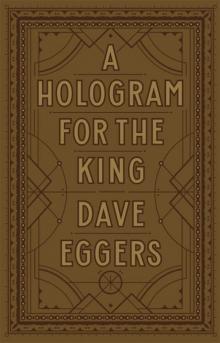 A Hologram for the King
A Hologram for the King Heroes of the Frontier
Heroes of the Frontier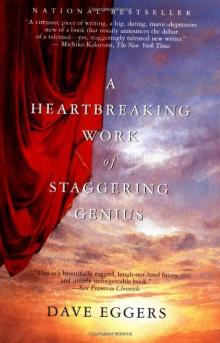 A Heartbreaking Work of Staggering Genius
A Heartbreaking Work of Staggering Genius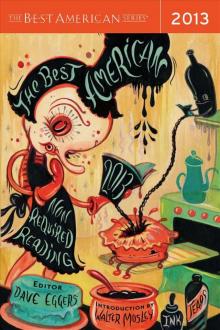 The Best American Nonrequired Reading 2013
The Best American Nonrequired Reading 2013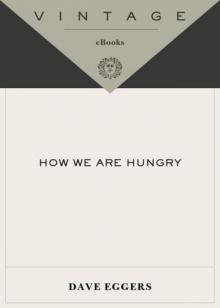 How We Are Hungry
How We Are Hungry The Circle
The Circle What is the What
What is the What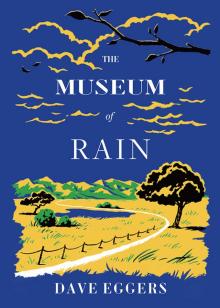 The Museum of Rain
The Museum of Rain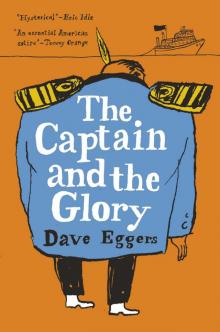 The Captain and the Glory
The Captain and the Glory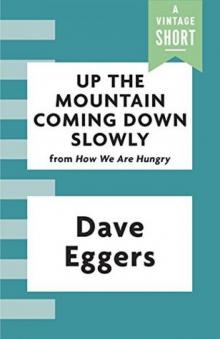 Up the Mountain Coming Down Slowly
Up the Mountain Coming Down Slowly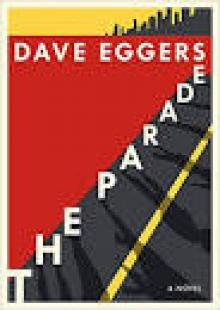 The Parade
The Parade The Monk of Mokha
The Monk of Mokha Your Fathers, Where Are They? And the Prophets, Do They Live Forever?
Your Fathers, Where Are They? And the Prophets, Do They Live Forever? You Shall Know Our Velocity
You Shall Know Our Velocity The Wild Things
The Wild Things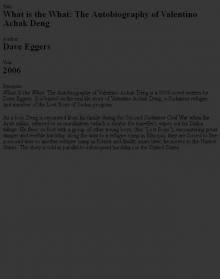 2006 - What is the What
2006 - What is the What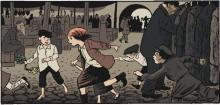 The Best American Nonrequired Reading 2011
The Best American Nonrequired Reading 2011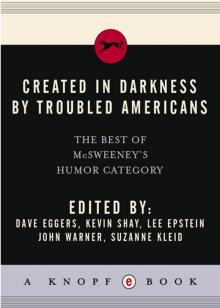 Created in Darkness by Troubled Americans
Created in Darkness by Troubled Americans